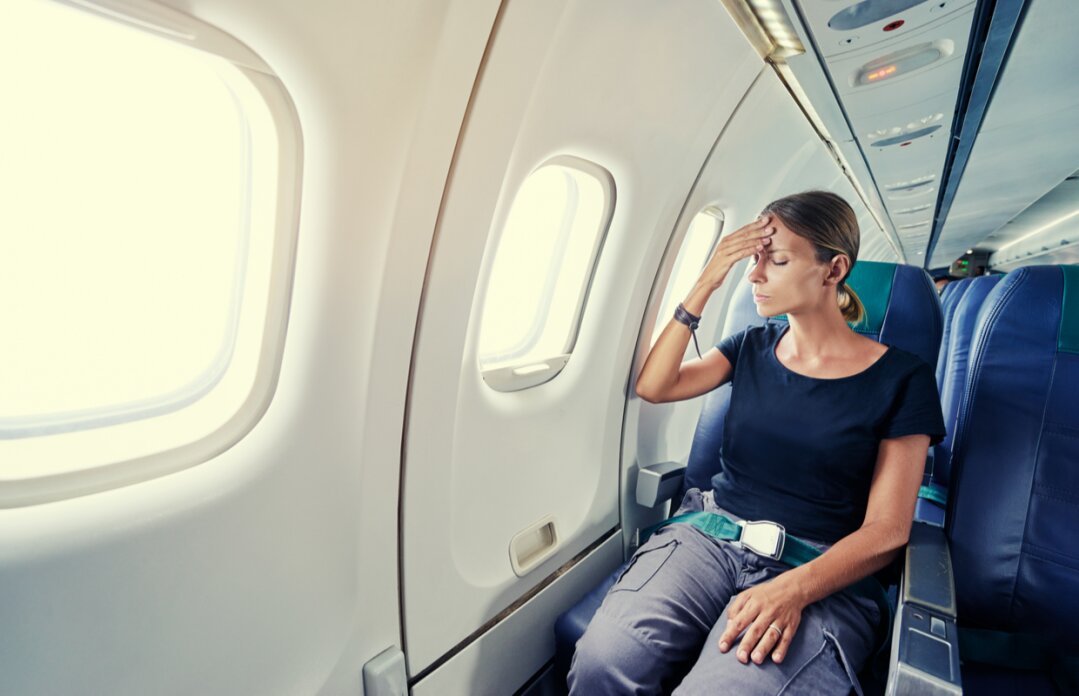A Quick Guide
This article provides useful tips on how to deal with flight anxiety, including tricks to get over your fear and have a stress-free flight. We’ll look at the underlying reasons for flight anxiety, and go over typical symptoms, along with a variety of management techniques for anxiety before, during, and after the flight.
Understanding Flight Anxiety
Air travel has transformed the way we connect with the world, making it simpler and more convenient than ever before. But for some people, the very concept of flying can cause overwhelming anxiety and panic. Many people suffer from flight anxiety, also known as aviophobia, but the good news is that it is something that can be treated.
It’s critical to comprehend the underlying reasons and typical symptoms of flight anxiety before diving into ways to cope. Many things, such as a fear of heights, a lack of control, turbulence, claustrophobia, or previous unpleasant experiences, might cause a fear of flying. Flight anxiety symptoms can include trembling, rapid breathing, sweating, elevated heart rate, and a sensation of approaching doom.
Why Does Flight Anxiety Happen?
Aviophobia, frequently known as flight anxiety, can have a number of underlying reasons. Individuals can more successfully deal with their concerns if they are aware of these causes. Several common reasons for flight anxiety include:
Fear of Heights: Acrophobia, often known as a fear of heights, can make flying stressful, particularly during takeoff and landing.
Lack of Control: For some people, feeling as though they have no control over the flight and having to rely on the pilot and crew can cause anxiety.
Turbulence and Unknowns: Although turbulence is a normal component of flight, it can be upsetting for nervous passengers who worry about the unknown.
Claustrophobia: Some people experience claustrophobic reactions when they are in an enclosed place, such as an airline cabin.
Past unpleasant or frightful experiences: Past experiences on flights have the potential to have a lasting effect on how someone perceives flying.
Fear of Accidents or Crashes: Being anxious about the worst-case situation, such a plane crash, can make flying more stressful.
Anxiety Disorders: The thought of flying might make people who already suffer from anxiety disorders more anxious.
Fear of the Unknown: For people who have never flown before or have only had limited flying experience, the unknown aspects of air travel might cause anxiety.
Tips to deal with Flight Anxiety
Let’s now examine ten useful tips to deal with flight anxiety and make travel more bearable:
Educate Yourself About Flying: By learning about the safety statistics, guidelines, and practices associated with air travel, you can debunk the mystery of flying and reduce anxiety caused by unforeseen circumstances. Knowing more gives one a sense of control and makes unreasonable concerns more understandable.
Practice Deep Breathing and Relaxation Techniques: Breathing techniques, such as diaphragmatic breathing, can soothe the nervous system and lessen anxiety. To reduce tension throughout the flight, try progressive muscle relaxation or guided imagery.
Desensitization and Gradual Exposure: Expose yourself gradually to the aircraft environment by visiting airports or watching recordings of planes. Over time, gradual exposure can help you become less anxious and desensitize you to triggers.
Seek Support: Discuss your flight anxiety with friends, family, or a mental health professional. Expressing your worries and fears might give you emotional support and help you put your worry into perspective.
Cognitive behavioral therapy (CBT): CBT is an empirically supported therapeutic method that aids in challenging and reframing problematic thinking. Anxiety about flying can be effectively managed by working with a therapist.
Select the Correct Seat: Sit in a position that is most comfortable for you. Choose a seat over the wings if you are afraid of turbulence because there is less motion there.
Distractions During Flight: Bring along some entertainment during the flight, such as puzzles, music, novels, and movies. Engaging thoughts can help you feel less worried.
Limit Caffeine and Alcohol: Avoid consuming too much caffeine and alcohol before and during your flight, as these might aggravate anxiety and impair your ability to relax.
Use grounding and mindfulness techniques: Be aware throughout the flight to stay in the present. Ground yourself in the present moment, use your senses, and pay attention to your breathing.
Visualize a Successful and Enjoyable trip: Before and during the trip, picture a successful and pleasant trip. Imagine that you are peaceful and at ease as you safely reach your destination.
After the Flight
Recognize your successes and advancements, no matter how minor they may seem. In order to overcome your flight anxiety, celebrate each successful flight. Keep in mind that overcoming flight anxiety requires effort, and each person will progress at a different rate. Be kind to yourself and acknowledge your progress as you overcome your fear of flying.
Key Takeaways
Flight anxiety is a common issue that many people have, but it doesn’t have to prevent you from wanting to travel and see the world. Understanding the reasons for flight anxiety, using a variety of ways to cope, and getting support will help you effectively manage your worries and enjoy your travel. Keep in mind that you are not alone and that you can overcome your fears and enjoy the freedom of flying if you are persistent and have the tools you need.



 Meditation and ADHD: Does it work & How to get started?
Meditation and ADHD: Does it work & How to get started?  Weaponized incompetence: what it is and how to detect it
Weaponized incompetence: what it is and how to detect it  ADHD & Insomnia: What You Need To Know
ADHD & Insomnia: What You Need To Know  The Hidden Struggles of Undiagnosed ADHD in Adults
The Hidden Struggles of Undiagnosed ADHD in Adults  Amnesia: Understanding Its Causes, Types, & Treatment
Amnesia: Understanding Its Causes, Types, & Treatment  Understanding Echolalia in ADHD: Causes, Symptoms, & Strategies for Support
Understanding Echolalia in ADHD: Causes, Symptoms, & Strategies for Support